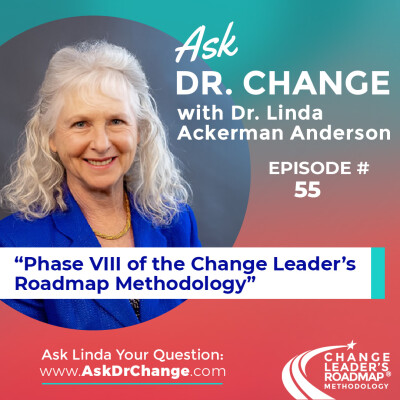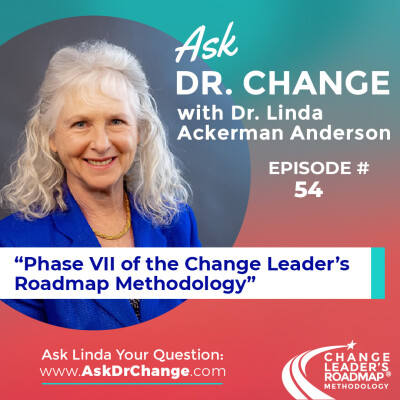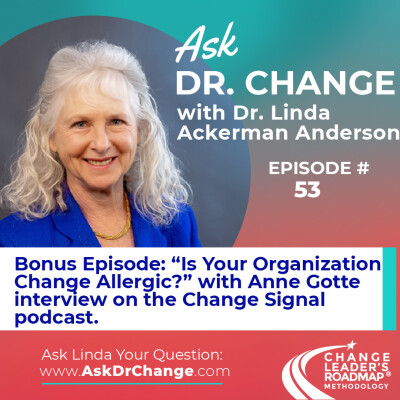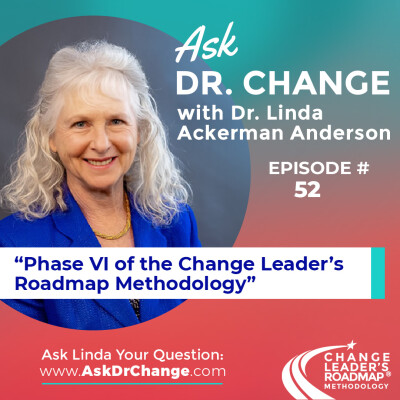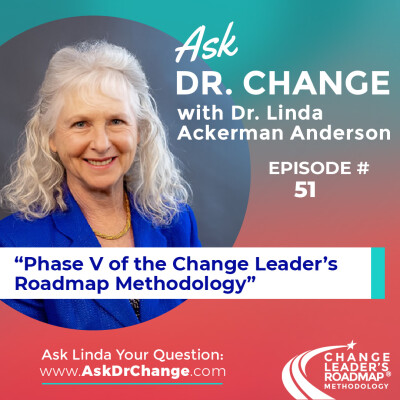- Speaker #0
Welcome to Ask Dr. Change. I'm Dr. Linda Ackerman-Anderson. I'm happy to have you join me today to explore how to seriously up-level your leadership and consulting to transformational changes, all through Conscious Change Leadership. Welcome. Today's episode is a special occasion for us. I have with me Andrew Johnson, who is an ex-Being First partner, a dear friend and colleague, more like family, like my brother, and someone who is as knowledgeable about the Being First methodology, our whole approach to conscious change leadership, than anybody else beyond Dean and myself. So I'm honored to have Andrew here introduce himself in just a moment. The setup for today is Andrew is going to be interviewing me about my perceptions of what's happening in the world and the changed space. Andrew, welcome.
- Speaker #1
Thank you, Linda. It's so good to be here, and it's so good to get to visit after a few years of COVID and missing each other, and I'm really delighted to be here. I think the first thing I would say about me is I'm a conscious change leader.
- Speaker #0
Absolutely.
- Speaker #1
And I'm a conscious change leader because of you and Dean. I came into this having heard you guys and the invitation. the lure of showing up differently in the world for what the world needs was so strong for me. And I basically shut down my own company. for over 10 years to join you and to become fluent and to support you. And so that's my main identification professionally is a conscious change leader. Beautiful.
- Speaker #0
Yeah. And you are.
- Speaker #1
Thank you. Thank you.
- Speaker #0
So say, Andrew is a master coach and the most profound question asker coach that walks the planet. Absolutely. Andrew brings the depth of knowledge and wisdom and worldliness and mindfulness, not only to everything that you do, but clearly to your coaching practice. So if you would set a little context for us on the positioning for today's interview.
- Speaker #1
Conscious change leadership didn't arise out of a vacuum. And the world context in which your field that you have developed and named is becoming increasingly needed, required. So the world we're in now is becoming increasingly polarized, increasingly diverse, but also increasingly economically disparate. And so there's greater tension. the rate of change is already outstripping our ability to adapt to it. The rise of AI, the consequences of climate change bearing down on us harder and harder with every season. All of those forces coming together really... bring to the foreground how much conscious change leader is required. So to me, that's the context in which your expertise is being served and required.
- Speaker #0
Thank you for that. We feel very passionately about that and the positioning that you're making because of the needs out there in organizations, in countries, in the world itself, in the whole political forum, how that's playing out in the world and here in the United States. And it is our intention to further the whole field of change in developing conscious change leaders in leaders. themselves, as well as consultants who serve leaders and organizations and other types of systems.
- Speaker #1
Yeah. So inside of all that, how do you see the change space now? What gets your attention?
- Speaker #0
Well, what I love is that the change space has gotten legitimacy all the way back from industrial psychology, organization development. change management, project management, organization design, all of those methodologies, change itself is becoming more and more recognized as a need. Unfortunately, many cases, because we're not handling it very well, we're not getting the results fast enough. inexpensively enough, concurrently enough with the needs in our mostly organizations and large systems. So for me, the field is well-founded and needs expansion and extension into the conscious piece, the change piece, the leadership piece of the whole body of work of conscious change leadership. And the more leaders can take on and consultants can take on how to support leaders and organizations, the better off we'll be. Dina and I have for years played with the idea of, you know, conscious change leadership is a field itself beyond change management, beyond organization development, beyond agile and project management. It really is a whole body of work needing to be understood, learned. embraced. So I'm thrilled about being able to be of service around that.
- Speaker #1
What I love about conscious change leadership as a field. well, there's many things, but in particular is that it doesn't set itself up as being in opposition to change management, project management, all those things that you mentioned, agile. It includes all of them and goes beyond them. So in a way, subsumes them, transcends them, includes them. And so there's room for everything within a larger whole. that conscious change leadership provides. And so further to that, what is it that as someone who is becoming maybe a conscious change leader, as you scan those other fields and disciplines, what is it specifically that conscious change leader calls forth in people who might be coming from one of those other disciplines?
- Speaker #0
Fabulous question. So in response. And anyone who is skilled in any of the traditional existing change methodologies today that we've just mentioned, project management, change management, agile, etc., they're all designed to see specifically from their own point of view what organizations, leaders, stakeholders need, what the process needs. And so what conscious change leadership is calling forth is broader seeing, deeper seeing. Being able to capture the complexities of the dynamics happening in organizations today are being challenged by the complexity. And now with the introduction of AI, even greater complexity. And so seeing broader, seeing deeper, seeing longer range are critical pieces of the conscious aspect of conscious change leadership. And then having change methodologies designed specifically. as you say, to embrace the value and contribution of each of the traditional methodologies and off their shoulders, then be able to take on more of what is actually happening that most leaders, most change consultants have not been able to see or embrace or learn how to address. So it really is an expansion and extension. Yeah.
- Speaker #1
It's just to stay with that seeing piece for a minute. I mean, what I'm picturing as you're talking about these other disciplines is that they have their point of view on the world and some of them have overlapping fields of view. And what conscious change leadership does is take all of that and broaden it and deepen it. And so one of the things that I learned in the very first course I took with you was seeing greater holes. And that's just so embedded in the substrate of conscious change leadership that if we don't see greater holes, if we don't take all of those disciplines, use the best of all of them and go beyond them, we're not able to capture the complexity that's required.
- Speaker #0
Right.
- Speaker #1
So, no, please, please go ahead.
- Speaker #0
Gee, I love to use around this is that. every one of the methodologies, change management, project management, all the communications training, training skills, they're all slices of the pie. Not just change leadership is the pie. Right. And so when you say the whole, it's really being able to see how everything, how what's required and then how everything that we've created to date contributes. And then what else is needed to have it fully integrated in right time. in the process so that it has the impact. Because setting up project management for projects and then later after deployment, change management comes on board, misses enormous opportunities around the complexities of dealing with the human dimension, especially of transformation, earlier in the process. And so if you're coming from a conscious change leadership perspective, you see how to use all the value. that's already been recognized and created and often used, but isn't adequate or sufficient to the complexities of transformation as required, including And this is really important in terms of the consciousness and leadership piece. The shift of mindset, the shift of consciousness required in our leaders, let alone ourselves as consultants, in order to be able to see the whole, to see broader, to see longer, to see deeper, to understand what's needed to actually lead transformational change successfully.
- Speaker #1
Right. And a key mindset shift is. why wouldn't you want the whole pie?
- Speaker #0
Yeah. Yeah.
- Speaker #1
So for someone that is coming from maybe another discipline or someone who is in leadership who maybe not has been formally trained in any of those disciplines, how do you make that leap from a partial view to a bigger view to the widest and deepest possible view? What's required in getting there?
- Speaker #0
So a couple of different approaches to that of like, how do we open the door to this? How do we shed light on it? So sometimes it's through costly mistakes, things being missed or massive redos, or we don't get the outcomes that we're intending from the major changes or transformational changes. And that's a wake up call. sometimes it's recognizing the pattern of change being too costly or ineffective, and therefore leaders saying, you know, we could be better at changed leadership. How could we build our changed leadership capability? Then a part of what we do in our approach is to help leaders see themselves in action. both their best selves and their worst selves. Because if they can begin to see themselves in action, they can begin to now objectively, non-judgmentally, they can begin to recognize. I could be doing that differently. I could see that differently. I could say that differently. And then developing themselves to be able to take on the larger challenges, the more sophisticated ways of portraying what they're asking of the organization. So sometimes it is through experiential learning, various trainings, even if it's just lectures or presentations. That they can begin to say, oh, wow, I could take some of these, they wouldn't call them blinders, but they are, some of these limitations to my seeing and broaden what I now see as necessary because I haven't addressed it to date. And then take on the capability development required to address those things they haven't actually seen before.
- Speaker #1
What I recall from training with you, Linda, is that moment that you just described of, oh, wow. where I started to see some of the unconscious assumptions that were driving my seeing, that were so deeply embedded, it didn't even occur to me to know how to see differently. And so the moment of starting to see those assumptions, for me, is a powerful one in seeing leaders build that conscious change capability inside of themselves, is busting through the limitations. of conventional assumptions, which we don't even know we're operating.
- Speaker #0
Right. It's like fish swimming in water and they're not aware of the water. You know, as you describe that it's. And so every individual needs to have this experience themselves. But individuals can't do this alone. So in relationship, in partnership, in teams, we need to be able to develop the capability to broaden the seeing, to stop action when we're living in an assumption that's limiting our ability to take on the real work. And so this is both for individuals. more than both for relationships, for teams, even whole functions. It's a massive driver of the kind of culture change we need today. So that waking up, being able to call attention, being able to course correct, no shame, no blame. Let's get on with what we now see we need. And because we didn't see it before, so what? everybody has limitations in what they've seen before. And so as soon as we can shed more light, it's a celebration. Okay, let's take this on. It's a challenge, okay, but let's take this on collectively. And that's super important. When you talk about the wake-up calls, one of our past students was a CEO of a major credit company in another country. And He went through our advanced training and he had so many insights. He actually left his position as CEO. He had completed his work there and started his own company, consulting company, to serve other executives. And he called the company AHA Moments. it was because that was that's what woke him up he said oh my goodness you know we have to take this broader and so aha moments became and that was indicative of exactly what you're saying is celebrating i now see more yeah
- Speaker #1
And as we talk about this, I can imagine a viewer thinking, oh, it all seems kind of straightforward. You just jump in and have all these aha moments and everything changes and now you're off to the races. I think it'd be really useful to talk about courage for a minute. The courage it takes to be willing to take the, and I'm going to call it perceived risk, of moving from the assumptions that leaders and practitioners are already in, and the habits that they have and the methodologies that they practice from into this bigger pie called conscious change leadership. Can you talk a little bit about that? where you see those moments of courage.
- Speaker #0
Yeah. Well, again, as an individual, it's a critical piece to be able to recognize what's my motivation to take on? What's my intention? How do I move forward with this individually? But again, as we share this with teams so that a team collectively can generate and support each other to have the courage and... This is not risk empty in this, but being risk averse is a limitation to then being able to try out things we've never done before. We work with one CEO in a very large utility company. he basically introduced to his top 300 people who he'd never brought together before. He said, the future is, this was at the time of deregulation of utilities, and he said, the future is deregulated. I have never lived in a deregulated environment. And so I don't know how to do this. You can't lean on me to have all the answers. Collectively, we need to figure this out ourselves. That was the most courageous statement. There wasn't a dry eye in the house. That was the most courageous statement for him to say, you can't look to me in this new reality. We have to look to each other and figure this out together, which they did brilliantly with support. But it. And it was, as Dean says, once you see what you see, you can't unsee it. And so he saw that he was a limitation to the future and realized at his. close to retirement, which he did shortly thereafter, he needed to release the organization to now what it saw as needed. And God, talk about courage. But he saw what he saw and he couldn't back off it.
- Speaker #1
Yeah. And so what I'm hearing in that is that there's, just teasing out what's implicit here is that Okay, it might seem like a risk. It might seem like it takes courage, but what's riskier? Staying hot when the rate of change in the world and the rate of complexity and interdependence and uncertainty continues to grow to stay or to maybe even double down on what we know seems even riskier than trying something that at least has the potential to include it. Factor it in. deal with it in a way that, and I'll come back to the insight that I kept having when I was a participant in the trainings. This is so adult. It just makes so much sense and is so adult. And so to me, that... really mitigates the sense of perceived risk is to realize this is an adult way. And I say adult because it factors in that we are inherently uncertain. We can't know. The rate of change is greater than we can get our arms around. unless we open as widely as we can.
- Speaker #0
Yeah, absolutely. You know, I think about what stops courage is fear. And so how much fear are we allowing to control leadership decisions moving forward? And the depth of fear driving the actions, the decisions, the behavior that's happening now is beyond alarming. and yet you ask somebody, so what are you afraid of? I'm not afraid. The lack of awareness of what the core drivers are is very much what limits the courage to move forward into the future. We are evolving forward. And so all the activities, all the wars, all the debates moving us backwards is all fear-driven. Backwards is... we're more in control, we have less fear, you know, we know what to do, we know what's in charge because we lived it before. The idea of moving forward into... I won't say a fully unknown reality because we can craft a lot of what we want to have happen if we're vision driven versus fear driven. Right. The critical part of waking up leaders at all levels, at all scales, to be able to take on the courage and step over, not ignore, not deny, but step over the fear that previously had constricted their ability. Blocked them from moving ahead. Right. Yeah.
- Speaker #1
So... Talking about the future, let's get personal. What's cooking in your world and in Dean's world? What's coming? What's evolving?
- Speaker #0
Excellent. So we have recently upgraded the Change Leaders Roadmap methodology, our major, most comprehensive methodology for leading change projects of any magnitude. So we've recently upgraded that and we're positioning it.
- Speaker #1
No small thing.
- Speaker #0
No small thing. major work, positioning it to be more technology available. Yeah. And so that's coming next. That's a huge piece. We are going to be offering a certification in the Change Leaders Roadmap, which we've never done before. We've trained thousands and thousands of people in it, but never certified. And so now we're going to be offering certification for the Change Leaders Roadmap, which is the conscious change leadership approach. to leading major projects and transformational change. I'm going to be completing a book on a conscious change leaders guide to culture change. And Dean is writing a book on optimizing, which is the very specific process that we go through to alter mindset and alter internal states so that we can produce much greater outcomes and deal with much more complex challenges that up until now. we have limited ourselves from being able to take on. He's also going to be offering deeper work into his self-mastery work and continuing to do our Leadership Breakthrough Walk the Talk of Change program, which is the life-changing experience for leadership teams to wake up to how to see farther, deeper, more complexity as a team. So that's passionate work for us. Really wonderful. I think both Dean and I are committed at this point to teaching others. And so we're at an age, we're both in our 70s, we're at an age where we have so much to continue to give, but we don't want to take on one at a time. We want to take on supporting others to go out and do this work. If there's anything underlying all of the activities we have going on, it's that, teaching others to carry this work forward.
- Speaker #1
Yeah, mentoring the future generations that will need to deploy this to solve the wicked problems we're in.
- Speaker #0
It's one reason why I started this podcast. So to reach more, to reach beyond the classroom or the Zoom room or whatever, so that others have the opportunity to tease into various critical topics for leading change effectively.
- Speaker #1
What's the first step? someone who's curious and decides, wow, this sounds really good. I want to discover more about conscious change leadership or take the next step or the, maybe the first step towards it. What, what should they do?
- Speaker #0
Well, you can scan through the various podcast episodes because Dean and I did a wonderful overview of conscious change leadership. Our first book, Beyond Change Management, How to Produce Breakthrough Results Through Conscious Change Leadership, is a great guide for it. And then one of the blessings of the COVID shutdown was allowing us to put some of the conscious and some of our change work into an online format. So Leading Transformational Change is our online program. It covers over 12 weeks of time a day a week. where we go through the 10 most critical strategies for leading transformational change effectively. That would be a major step in the entry into the certification process for the Change Leadership Roadmap.
- Speaker #1
Yeah, beautiful. And I just referred to a dear friend of mine who's starting his journey as a consultant in the world to take this online leading transformational change, LTC, as we call it on the inside. And he came out of that, took me out for lunch and told me he was. blown away with what a strong foundation he feels he has to start concretely helping his clients. Yeah.
- Speaker #0
Wonderful.
- Speaker #1
He's so grateful.
- Speaker #0
Yeah. Well, great. And thank you for inviting him in. Of course. It's very rewarding work because we work real projects, real issues, real mindsets as we go through the programs. It's powerful. Yeah. And it's a great gift to be able to. to offer it. It truly is. And I look at you, Andrew, and it's like, okay, you went in at the beginning and you came out where you are now and doing everything that you're doing now. And it's just such a delight to see how deeply you have embraced this work and added it to your own depth to begin with.
- Speaker #1
It's a joy to be on the inside of what you're speaking.
- Speaker #0
Well, I appreciate this time. It's been so much fun to be able to talk openly and respond to important questions that I hope you will appreciate and take to heart and possibly join us on this journey of learning about conscious change leadership in your own work so that you can carry it forward as you offer your services to the world. Thanks for spending time with us today. And thank you, Anne.
- Speaker #1
Thanks for inviting me to interview. Absolutely. It was easy.
- Speaker #0
Take care, all. Today's subject is one of the key topics that we feature in our Leading Transformational Change online program. If you'd like to learn more about Leading Transformational Change, go to beingfirst.com forward slash LTC. Thanks for spending some time with me today. I hope you gained some valuable insights for your work. Please send me your questions and challenges by going to askdoctorchange.com.


